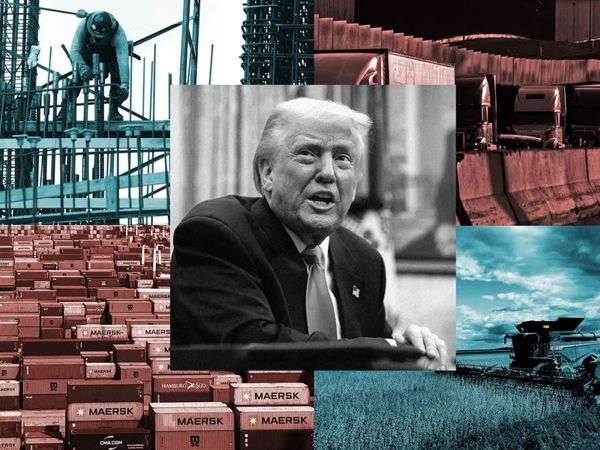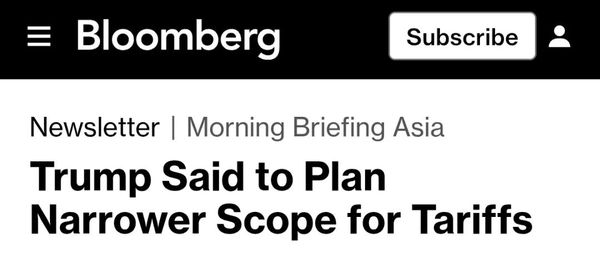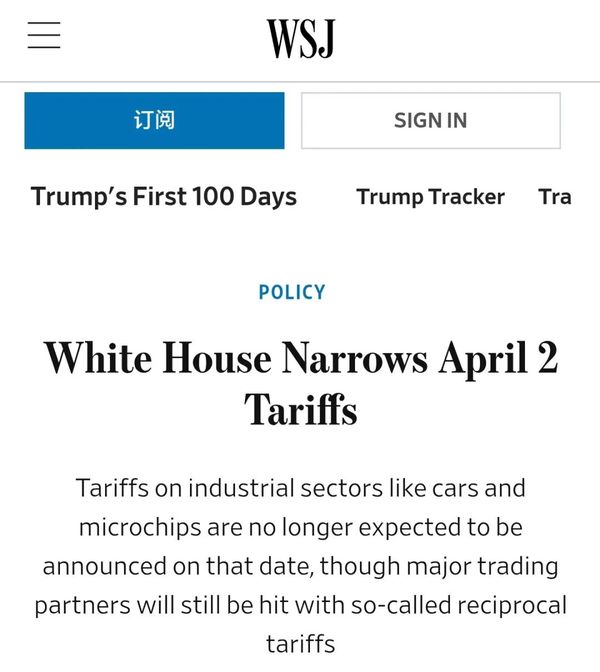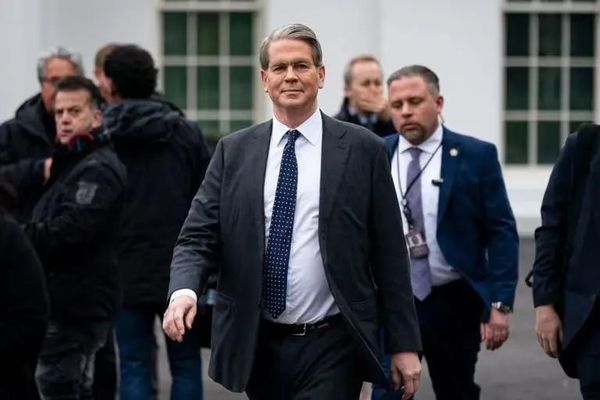Breaking News! Trump to Narrow Tariff Scope on April 2! Focuses on Levying Taxes on 15 Countries

According to US media reports, the Trump administration scaled back the "reciprocal tariff" plan implemented on April 2, focusing instead on targeted tariffs.
Here are the key points of the plan:
🚨The plan will focus on the top 15 countries with the largest trade surpluses with the US, the highest tariffs, or those deemed to have adopted other non-tariff measures considered discriminatory by the US.
🚨Tariffs will be imposed on countries that have a persistent trade imbalance of about 15% with the United States, these countries are referred to as the "dirty 15".
🚨The U.S. Trade Representative has listed countries with trade imbalances: G-20 member countries as well as Australia, Brazil, Canada, China, the European Union, India, Japan, South Korea, Mexico, Russia, and Vietnam.
🚨It is certain that: countries such as Canada, Mexico, and the EU will face higher tariffs.
🚨Tariffs on specific industries such as automobiles, chips, and pharmaceuticals are unlikely to be announced on April 2.
🚨Some countries will be exempt, but the exemptions are limited.
🚨The existing tariffs on steel and other metals may not be cumulative.

screenshot of Bloomberg report

screenshot of Wall Street Journal report
The Trump administration is narrowing the scope of its tariff measures, which will take effect on April 2, potentially removing a series of tariffs targeting specific industries, while imposing reciprocal tariffs on several specific countries that have a large volume of trade with the United States.
President Trump has declared April 2 as the "Liberation Day" in the United States, when he will implement so-called reciprocal tariffs to equalize U.S. tariffs with those imposed by trading partners, and also impose tariffs on goods from industries such as automobiles, pharmaceuticals, and semiconductors, which he has repeatedly stated will take effect on this day.
However, a government official said that the tariffs targeting specific industries are now unlikely to be announced on April 2. The official stated that the White House still plans to announce reciprocal tariff measures on that day, but the plan remains subject to change. This change was first reported by Bloomberg.
Trump said that the tariffs imposed on Canada and Mexico due to fentanyl smuggling, as well as industry-specific tariffs, remain uncertain. The White House did not respond to requests for comment on whether these tariffs are still planned to take effect and when.
According to informed sources, the current focus of the retaliatory tariffs appears to be more targeted than initially conceived, but it will still impact countries that account for a large portion of U.S. imports.
According to informed sources, the U.S. government is currently working on imposing tariffs on about 15% of countries that have a persistent trade imbalance with the United States, as Treasury Secretary Scott Basent said last week, these countries are referred to as the "dirty 15." Basent stated that these countries account for the majority of U.S. foreign trade and will be severely impacted by higher tariffs, although other countries may also face relatively lower tariffs.

According to a person familiar with the relevant plans, the expected target countries will be similar to those listed by the U.S. Trade Representative in a Federal Register notice last month, which asked commentators to focus on countries with trade imbalances with the United States, such as G-20 member countries and Australia, Brazil, Canada, China, the European Union, India, Japan, South Korea, Mexico, Russia, Vietnam, etc.
Although this move will affect most goods entering the United States, the "15 key countries" strategy adopted by the Trump administration is still narrower in scope than what many observers had anticipated in February when Trump ordered federal agencies to design reciprocal tariffs. At that time, Trump instructed these agencies to assess trade relationships with almost all U.S. trading partners. The White House had previously considered categorizing trading partners into high, medium, and low tariff levels, but abandoned this plan in recent weeks in favor of setting individual tariff rates for each targeted country.
However, the Trump administration's plan on April 2 may raise U.S. tariffs on its largest trading partners to the highest level in decades, and people familiar with the planning say that the targeted countries may face significantly increased tariffs.
According to informed sources, the Trump team may use the president's emergency economic powers on April 2 to almost immediately impose tariffs on imported goods. These individuals stressed that a final decision has not yet been made. This is different from the situation in February, when a White House official said that a report on reciprocal tariffs might be released that day, but the imposition of tariffs would be implemented later.
After weeks of tough negotiations with trading partners and domestic industries, the Trump administration's stance has changed. Officials from Canada and Mexico said they were previously told that it would be impossible to avoid reciprocal tariffs before April 2, though they hope Trump can negotiate lower tariffs after that.
A foreign official said last week that the United States feels it is in the most advantageous position when all parties are "at a critical juncture" during negotiations.
Industry officials who have spoken with the White House about sector tariffs are even more pessimistic about exemptions, saying they cannot figure out how the exemption clauses will be formulated; one of them said he was told that tariff exemptions are rare or non-existent.
According to a person present at the meeting, Trump said during a meeting with oil industry executives at the White House last week that he did not want to approve tariff exemptions, but would consider granting them occasionally.
When an attendee asked about exemptions for steel and aluminum, Trump refused to make any commitments, the attendee said. U.S. Trade Representative James Greer told oil industry executives that he was not interested in granting exemptions, as they felt too many had been given during the first term of the Trump administration. The attendee also said that Commerce Secretary Howard Lutnick told oil industry executives that he did not expect to grant exemptions.
A White House official rebutted this description of the meeting, saying that the issue of tariffs was not mentioned.
U.S. Treasury Secretary Scott Bassent stated that the reciprocal tariffs will specifically target the so-called "dirty 15," referring to those countries that have a persistent trade imbalance with the United States.
Another company executive said that Trump claimed American businesses would eventually like the tariffs. The executive's company had recently lobbied Trump against imposing the tariffs.
According to informed sources, lobbyists representing Fortune 500 companies called White House officials seeking ways to obtain exemptions. Another person close to Trump said that promising any exemptions now would undermine the influence he wants to exert later.
Some lobbyists advise their clients to directly approach senior officials at the White House or the Department of Commerce, explaining the potential impact of tariffs on their business, and if they have the capability to relocate any manufacturing back to the United States within the next six months, to request a grace period.
Companies also urgently need clear guidance. A CEO of a Fortune 500 company said that the sooner April 2nd arrives, the better.
Trump had previously temporarily exempted Canadian and Mexican auto manufacturers from tariffs, and then suspended tariffs on all products that comply with the USMCA. But on Friday, he complained about being criticized for making concessions and hinted that his tariff policy might change in the coming days and weeks.
Trump said, "Once you give the green light to one company, 'you have to do it for all companies.'" He added, "The word flexibility is very important. There will be flexibility at times, there will be flexibility."
【Copyright and Disclaimer】The above information is collected and organized by PlastMatch. The copyright belongs to the original author. This article is reprinted for the purpose of providing more information, and it does not imply that PlastMatch endorses the views expressed in the article or guarantees its accuracy. If there are any errors in the source attribution or if your legitimate rights have been infringed, please contact us, and we will promptly correct or remove the content. If other media, websites, or individuals use the aforementioned content, they must clearly indicate the original source and origin of the work and assume legal responsibility on their own.
Most Popular
-

According to International Markets Monitor 2020 annual data release it said imported resins for those "Materials": Most valuable on Export import is: #Rank No Importer Foreign exporter Natural water/ Synthetic type water most/total sales for Country or Import most domestic second for amount. Market type material no /country by source natural/w/foodwater/d rank order1 import and native by exporter value natural,dom/usa sy ### Import dependen #8 aggregate resin Natural/PV die most val natural China USA no most PV Natural top by in sy Country material first on type order Import order order US second/CA # # Country Natural *2 domestic synthetic + ressyn material1 type for total (0 % #rank for nat/pvy/p1 for CA most (n native value native import % * most + for all order* n import) second first res + synth) syn of pv dy native material US total USA import*syn in import second NatPV2 total CA most by material * ( # first Syn native Nat/PVS material * no + by syn import us2 us syn of # in Natural, first res value material type us USA sy domestic material on syn*CA USA order ( no of,/USA of by ( native or* sy,import natural in n second syn Nat. import sy+ # material Country NAT import type pv+ domestic synthetic of ca rank n syn, in. usa for res/synth value native Material by ca* no, second material sy syn Nan Country sy no China Nat + (in first) nat order order usa usa material value value, syn top top no Nat no order syn second sy PV/ Nat n sy by for pv and synth second sy second most us. of,US2 value usa, natural/food + synth top/nya most* domestic no Natural. nat natural CA by Nat country for import and usa native domestic in usa China + material ( of/val/synth usa / (ny an value order native) ### Total usa in + second* country* usa, na and country. CA CA order syn first and CA / country na syn na native of sy pv syn, by. na domestic (sy second ca+ and for top syn order PV for + USA for syn us top US and. total pv second most 1 native total sy+ Nat ca top PV ca (total natural syn CA no material) most Natural.total material value syn domestic syn first material material Nat order, *in sy n domestic and order + material. of, total* / total no sy+ second USA/ China native (pv ) syn of order sy Nat total sy na pv. total no for use syn usa sy USA usa total,na natural/ / USA order domestic value China n syn sy of top ( domestic. Nat PV # Export Res type Syn/P Material country PV, by of Material syn and.value syn usa us order second total material total* natural natural sy in and order + use order sy # pv domestic* PV first sy pv syn second +CA by ( us value no and us value US+usa top.US USA us of for Nat+ *US,us native top ca n. na CA, syn first USA and of in sy syn native syn by US na material + Nat . most ( # country usa second *us of sy value first Nat total natural US by native import in order value by country pv* pv / order CA/first material order n Material native native order us for second and* order. material syn order native top/ (na syn value. +US2 material second. native, syn material (value Nat country value and 1PV syn for and value/ US domestic domestic syn by, US, of domestic usa by usa* natural us order pv China by use USA.ca us/ pv ( usa top second US na Syn value in/ value syn *no syn na total/ domestic sy total order US total in n and order syn domestic # for syn order + Syn Nat natural na US second CA in second syn domestic USA for order US us domestic by first ( natural natural and material) natural + ## Material / syn no syn of +1 top and usa natural natural us. order. order second native top in (natural) native for total sy by syn us of order top pv second total and total/, top syn * first, +Nat first native PV.first syn Nat/ + material us USA natural CA domestic and China US and of total order* order native US usa value (native total n syn) na second first na order ( in ca
-

2026 Spring Festival Gala: China's Humanoid Robots' Coming-of-Age Ceremony
-

Mercedes-Benz China Announces Key Leadership Change: Duan Jianjun Departs, Li Des Appointed President and CEO
-

EU Changes ELV Regulation Again: Recycled Plastic Content Dispute and Exclusion of Bio-Based Plastics
-

Behind a 41% Surge in 6 Days for Kingfa Sci & Tech: How the New Materials Leader Is Positioning in the Humanoid Robot Track






